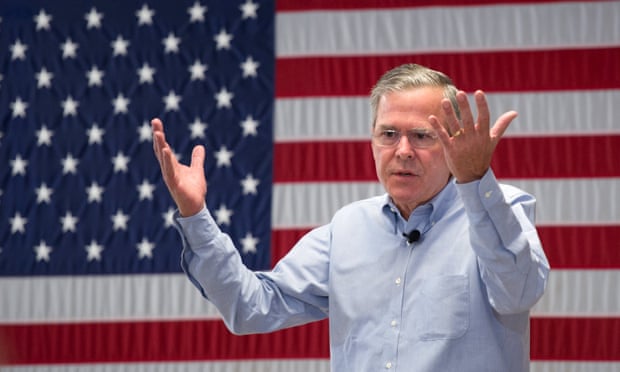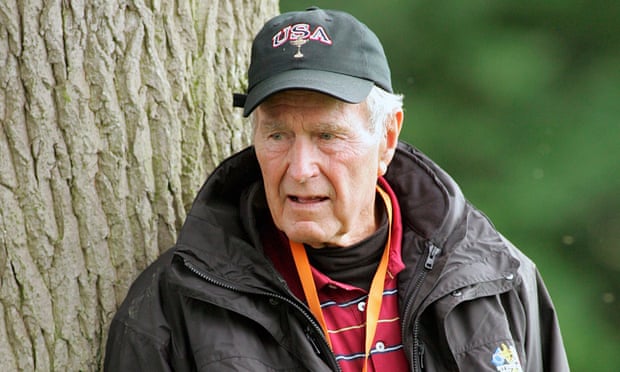Belonging to a political dynasty is supposed to be a shortcut to power. For Jeb Bush, however, it has become a millstone around the neck.
Even as the former Florida governor sought this week to relaunch his flagging bid to become the third member of his family to capture the White House, his father, George HW Bush, ended years of self-restraint to publicly chastise Jeb’s brother, George W Bush.
The 41st president’s bracingly frank comments about the 43rd president’s “hot rhetoric”, and his scathing assessments of his vice-president Dick Cheney and defence secretary Donald Rumsfeld, struck an unprecedented note of discord in a famously loyal clan that rivals the Kennedys and Clintons as American political royalty. To analysts, it appeared a terribly timed self-inflicted wound.
Questions about his brother’s legacy have dogged Jeb on the campaign trail and hindered his efforts to define himself as his own man. When first asked if he would have taken the same decision to invade Iraq, he gave four different answers. When he claimed George W Bush “kept us safe”, Donald Trump pointed out the September 11 attacks happened on that president’s watch.
Jeb Bush has also been attacked for hiring James Baker, his father’s secretary of state, and Paul Wolfowitz, his brother’s neoconservative deputy defence secretary who was one of the main architects of the Iraq war, as advisers.
The intervention by the 91-year-old patriarch has renewed the prospect of Jeb running against family ghosts.
“Jeb hasn’t been able to stake out a clear position regarding his brother,” saidGeorge Ajjan, a Republican strategist. “If he had been able to do so, his dad publicly criticising W’s administration would probably be helpful to him – ‘I agree with my dad, there were unhelpful people in my brother’s administration and I won’t make the same mistake.’
“But he’s been unable to do that, and though he’s waffled when asked about sensitive topics like Iraq, in the end he’s defended his brother. Because he hasn’t been clear and decisive, he’s failed to score important points in the minds of voters, either for independence or for loyalty.
“He comes across as half-pregnant when it comes to his brother and I’m not sure that these remarks of his dad will help him clarify. If anything, they’ll make it muddier for him.”
The relationship between Bush 41 and Bush 43 has fascinated pundits and historians. It also caught the attention of director Oliver Stone, who dramatised it in the film W.
The patrician Bush senior studied at Yale and went on to become a decorated navy pilot in the second world war, a member of Congress, ambassador to China and director of the CIA. His eldest son worked in the oil business and drank heavily before entering politics relatively late, but became the first child of a president to reach the White House since John Quincy Adams.
In a series of interviews between 2008 and 2012 with biographer Jon Meacham, George HW Bush took aim at his son’s 2002 state of the union address, in which he used of the phrase “axis of evil” to describe Iraq, Iran and North Korea.
“You go back to the ‘axis of evil’ and these things and I think that might be historically proved to be not benefiting anything,” Bush said.
“I do worry about some of the rhetoric that was out there – some of it his, maybe, and some of it the people around him. Hot rhetoric is pretty easy to get headlines, but it doesn’t necessarily solve the diplomatic problem.”
Although Bush senior supported the Iraq war and was close to his son on substantive issues, he became increasingly disturbed by the administration’s style. His stinging comments about key figures might have raised eyebrows if aimed at a rival party, never mind his flesh and blood.
He said of Cheney: “He just became very hardline and very different from the Dick Cheney I knew and worked with. Just iron-ass. His seeming knuckling under to the real hard-charging guys who want to fight about everything, use force to get our way in the Middle East.
“He had his own empire there and marched to his own drummer. It just showed me that you cannot do it that way. The president should not have that worry.”
But he added: “It’s not Cheney’s fault, it’s the president’s fault. The buck stops there.”
The elder Bush was no less cutting about defense secretary Donald Rumsfeld, a political rival since the 1970s whom he branded an “an arrogant fellow”, adding: “I think he served the president badly. I’ve never been that close to him anyway … There’s a lack of humility, a lack of seeing what the other guy thinks. He’s more kick ass and take names, take numbers. I think he paid a price for that.”
The timing is awkward for Jeb, to say the least, blurring the line between politics and family in every media interview and casting a shadow over Tuesday’sRepublican debate, where he will be in desperate need of a strong performance.
When the idea for the biography was first discussed, it was intended for publication only after George HW Bush’s death, Meacham said on Friday, but that plan quickly altered. Bush approved publication of the comments at the end of last year. Jeb’s imminent run for the Republican nomination did not appear a significant factor in his thinking.
“Very initially, the project was supposed to be posthumous,” Meacham explained. “That condition changed four or five years ago, and last December I went back to President Bush 41 with all of these comments. I showed them to him again and I said, ‘I can’t take this off the record, sir, obviously. If you wish to in any way clarify or expand on something or say that you said – something in the heat of the moment but you no longer think it?’
“And he looked me in the eye and said, ‘That’s what I said.’ So there’s no controversy about that. I showed him exactly what he had said and gave him the opportunity to offer my readers more thoughts on that or some complexity or nuance, but not at all.”
Meacham, however, rejected the notion that the family quarrel represents a further blow to Jeb’s bid for the White House.
“I don’t see how it could. I have been surprised by the thought that this could have a lasting impact. I’m writing history, not a political book of the moment.”
Meacham, a former Newsweek editor and Pulitzer Prize-winning author, said he had gone to George W Bush and asked for his response to the comments.
“President 43’s reaction was that ‘my father never expressed this opinion to me either during the presidency or afterward. I disagree with his characterisation.’ This is me paraphrasing: ‘For better or for worse, the administration was what I wanted it to be. I was making these decisions.’ This is a quote: ‘This was my philosophy.’
“On the only direct criticism of the son, in which President Bush 41 said things like the axis of evil weren’t helpful, 43 said: ‘Well, my rhetoric could get pretty hot at times.’ And then he joked with me, ‘But you know, they understood me in Midland [Bush’s hometown in Texas].’”
The author added: “I certainly don’t think he was upset. He was intrigued that his father had this opinion but had not expressed it to him. I think they are incredibly close personally and I think they spent very, very little time discussing the substance of policy from 2000 to 2009.”
Meacham, whose book, Destiny and Power: The American Odyssey of George Herbert Walker Bush, is published on Tuesday, also approached Cheney with the remarks.
“Cheney referred to it as fascinating,” he said, “and then said it was simply obviously two different views of how the vice-presidency should be conducted, that he had executed his office in the way that Bush 41 wanted him to conduct it.
“The chief point is that the strategic environment after September 11 was different from the strategic environment after the invasion of Kuwait. President Bush 41 was very clear: ‘These were different wars for different reasons.’”
Jeb said on Thursday he had not read the book. “My thought was that Dick Cheney served my dad really well,” he told the Associated Press. “And he served as vice-president, he served my brother really well. Different eras. Different times.”
Critics say the “House of Bush” has a sense of entitlement that should be challenged, but supporters praise the book for its honesty and suggest this could reflect positively on Jeb.
Anita McBride, who served in the White House for Ronald Reagan and both Bushes, said: “Will it make it harder for him, this book coming at this time? I’m one of those who see it in a different way. I see it in a way that underscores and brings to light the duty, honour, family, country that is part of who the Bushes are.”


0 comments:
Post a Comment